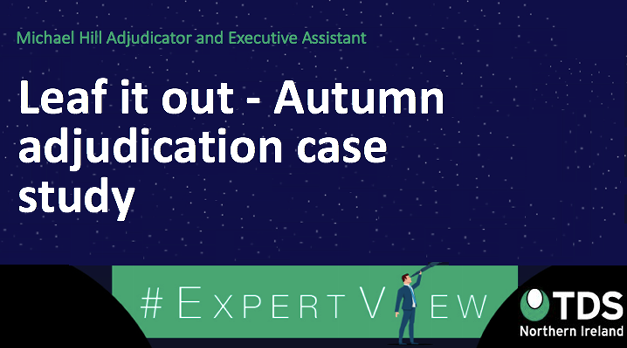#ExpertView: Leaf it out - Autumn adjudication case study

In this week’s #ExpertView, Michael Hill, an Adjudicator at TDS Northern Ireland outlines a dispute around the outdoor areas of a property being affected by autumnal weather.
Whether it’s frozen pipes in winter or tenant change-overs in summer, each new season brings its own unique challenges for landlords and letting agents when it comes to tenancy deposit protection.
In this case study, Autumn conditions led to a tenancy deposit dispute over repairs to guttering and drains blocked by the falling leaves.
The tenant moved into the property in the hot summer months and the check-in report didn’t report any issues with the exterior of the property or the garden. In addition, there was also no specific mention of the drains or gutters.
When the tenant moved out of the property in the Autumn, the weather was distinctly different and in the preceding weeks it had been particularly blustery, causing the trees in the garden and surrounding areas to shed their leaves around the property.
When the last inspection of the property was carried out, the landlord identified issues with blocked gutters and drains which were recorded in the check-out report. In addition, the landlord supplied evidence to support the claims laid out in the report with photographs of the affected areas. The landlord submitted a claim for a deduction from the tenancy deposit in a sum of £100 to clean and clear the gutters and drains; stating that these were the tenant’s responsibility.
The tenant responded that they had upheld their end of the tenancy agreement – which confirmed that the garden should be maintained to a ‘good standard’ – by clearing leaves which had fallen to the ground. They argued that there were no stipulations in the tenancy agreement for them to maintain gutters and drains, pointing out that these were the responsibility of the landlord.
Once all the evidence and statements had been reviewed, the TDSNI’s adjudication team agreed with the tenant that it was the landlord’s responsibility to look after these areas, and did not make any award to the landlord. The tenancy deposit was therefore returned to the tenant.
There were a number of reasons behind the adjudicator’s decision in this case. Firstly, the tenancy agreement did not clearly state that the tenant is responsible for the clearing of gutters. Whilst the tenant may be responsible for reporting problems identified within the fabric of the building like heating, the structure or drainage in this case, it remains the landlord’s responsibility to fix the problems unless the tenant had caused damage through negligence.
As the landlord is responsible for the drains and guttering, it would be sensible to check the condition of them regularly, especially before the autumn or winter seasons where the weather can cause problems with the exterior of the property.
Further case studies from the adjudication team are available in the Case Studies section of the TDSNI website.
About the author
 After studying law at university, Michael Hill joined TDS in early 2015. Having started as a caseworker, Michael began working as a full-time adjudicator in September 2015. He currently works part-time as an adjudicator and part-time as executive assistant to the CEO, Steve Harriott. Michael has been responsible for adjudicating in over 2,000 disputes.
After studying law at university, Michael Hill joined TDS in early 2015. Having started as a caseworker, Michael began working as a full-time adjudicator in September 2015. He currently works part-time as an adjudicator and part-time as executive assistant to the CEO, Steve Harriott. Michael has been responsible for adjudicating in over 2,000 disputes.
About TDSNI:
Tenancy Deposit Scheme Northern Ireland (TDSNI) is a government-approved scheme for the protection of tenancy deposits; TDSNI offers both Insured and Custodial protection and also provides fair adjudication for disputes that arise over the tenancy deposits that we protect.
TDSNI Insured Scheme: where a TDSNI member can hold the tenancy deposits as stakeholder during the term of the tenancy.
TDSNI Custodial Scheme: where TDSNI hold the deposit for the duration of the tenancy.
TDSNI Academy: TDSNI provides property professionals with invaluable training in tenancy deposit protection and tenancy deposit disputes.
TDSNI can only comment on the process for our scheme, other deposit protection schemes may have a different process/require different steps. Content is correct at the time of writing.
